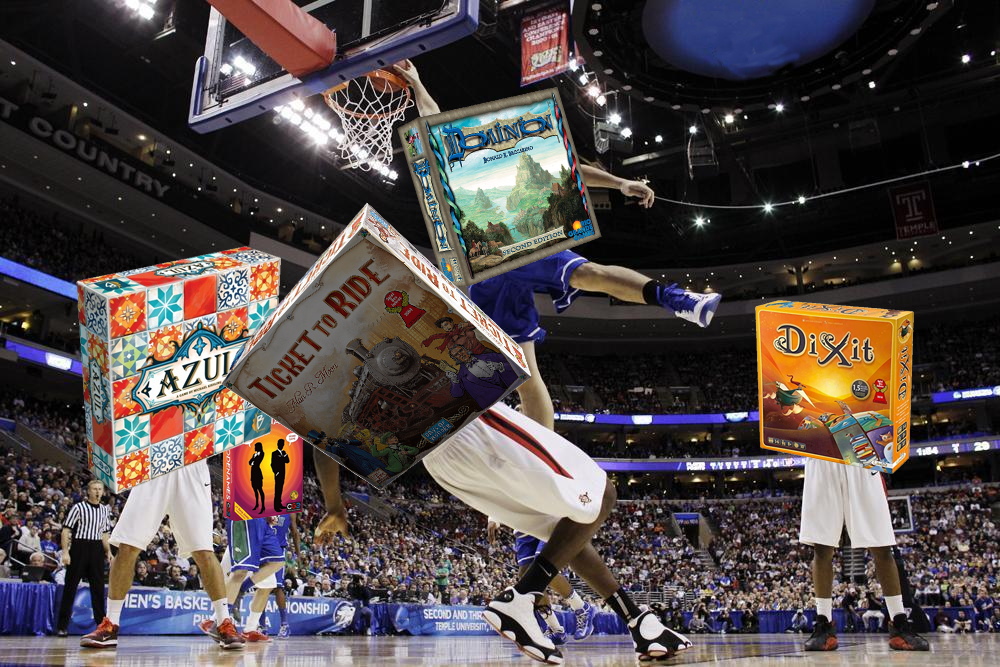Wondering what this is all about? The Turn Order writing crew is talking about every game to ever win the Spiel de Jahres award—think of it as the Oscars of Board Gaming. We introduced the bracket and spent some time with the “Play-In” games in each bracket. You can catch up on all our coverage here.
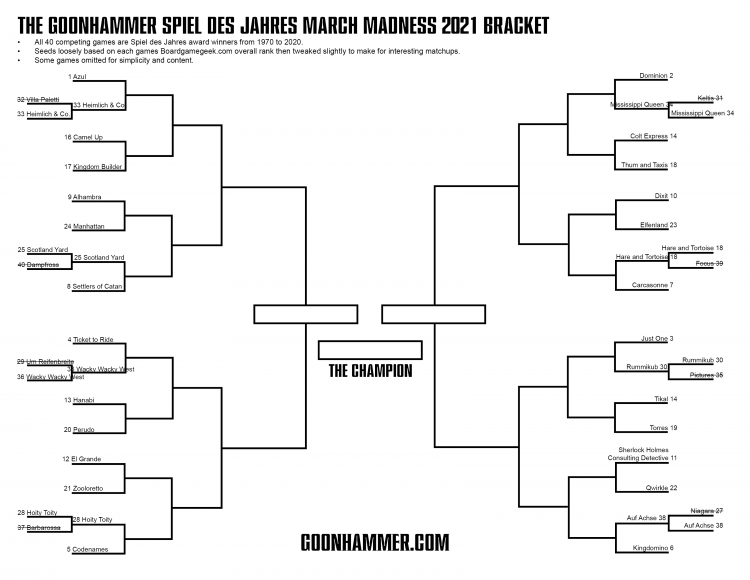
With the Play-In games done, the main bracket is set. This is what’s known as the Round of 32 in NCAA Tournament parlance; at this point Vegas has slowed down a little bit, due both to the lower number of games and the 2-day hangover starting to set in. The basketball tournament opens with the Round of 64 on Thursday/Friday and moves right into the Round of 32 on Saturday/Sunday before the “student athletes” return to campus to study classes film.
We’re going to go region by region talking about every game, while also picking a winner for each matchup. For those unfamiliar with the terms, winners of the Round of 32 head into the “Sweet 16”. From there it’s on to the “Elite 8” and ultimately the “Final 4”.
Just One
2019’s Spiel winner is Just One, from Repos Production. Just One is notable because it’s one of the very few cooperative party games on the market. No pairs, no teams, no “getting you points helps me get points” systems like party drawing games. Everyone is working together hoping to score as many points as possible as a group.
Points are represented by word cards. Each turn one player draws a card from the stack and places it on their easel facing the rest of the group. This player has no idea which 5 words are printed on this card, and has to pick a number between 1-5. The rest of the group now has to get that player to guess their corresponding word. To do so, they’ll each right just one word on their easel hoping that this collection of single word clues is enough to nudge the guesser in the right direction.
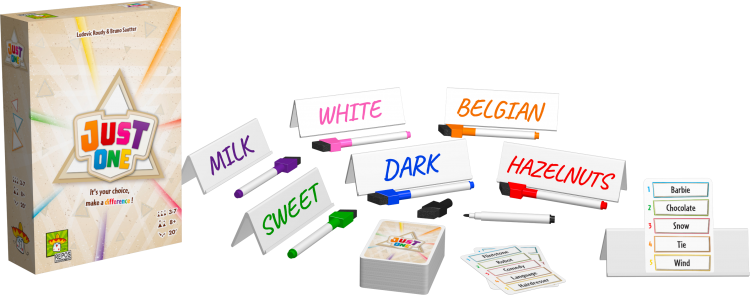
Say the word is Hammer. You might go to words like “Nail”, “Claw”, “Tack”, “Wood”, etc. There is of course, catch. Once words are written down but before they are revealed to the Guesser the group has to show each other what they wrote down. If two or more people wrote the same word those are erased. The guesser doesn’t get to see them. Suddenly “Nail” does not feel like such a great clue. The most obvious clues become risky. If anyone else writes it then you don’t get to use it, but if no one writes it down suddenly all you’ve provided is a pile of esoteric word-adjacent clues that may lead the Guesser astray.
Just One is one of the most accessible games in this competition. Supremely easy to teach and get the hang of, and capable of providing a pile of laughs on any given night. It scales pretty well too; the risk that comes with choosing obvious clues changes in different ways at different player counts.
Rummikub
Rummikub, winner of its Play-In game against Pictures came to play. It’s already defeated one creative party game, could it be the first Play-In game winner to advance to the Sweet 16?
Tikal
Tikal holds a particularly special place in my heart due to the setting. The name Tikal refers to an ancient Mayan city in what is now Guatemala, the country where I was born. I’ve been there a number of times and if you’ve ever seen Star Wars you’re likely more familiar with the city than you know. The exterior shots of the Rebel Base were filmed at Tikal and thus the exterior design of those temples (and the ones seen in Rogue One) are based in Mayan architecture. It’s this little factoid that led Oscar Isaac—also from Guatemala—to request that Poe Dameron be from Yavin as a part of his background.
But we’re not here to talk about Guatemala, we’re here to talk about Tikal. Designed by Wolfgang Kramer and Richard Kiesling, Tikal won the 1999 Spiel in what was the 4th of Kramer’s record 5 Spiel wins. It is not the first Action Point allowance game but it is one of the most influential. In Tikal, players are excavating a Mayan city using their pool of 10 Action Points in the best way possible. A new tile is revealed each turn and placed in ways to expand (or restrict) movement. Then you spend your points to move your workers around, excavate the temple to make them more valuable, grab treasures, or post a guard on a temple you want to permanently claim. Eventually a volcano erupts and you score points; after 3 scoring rounds the game ends.
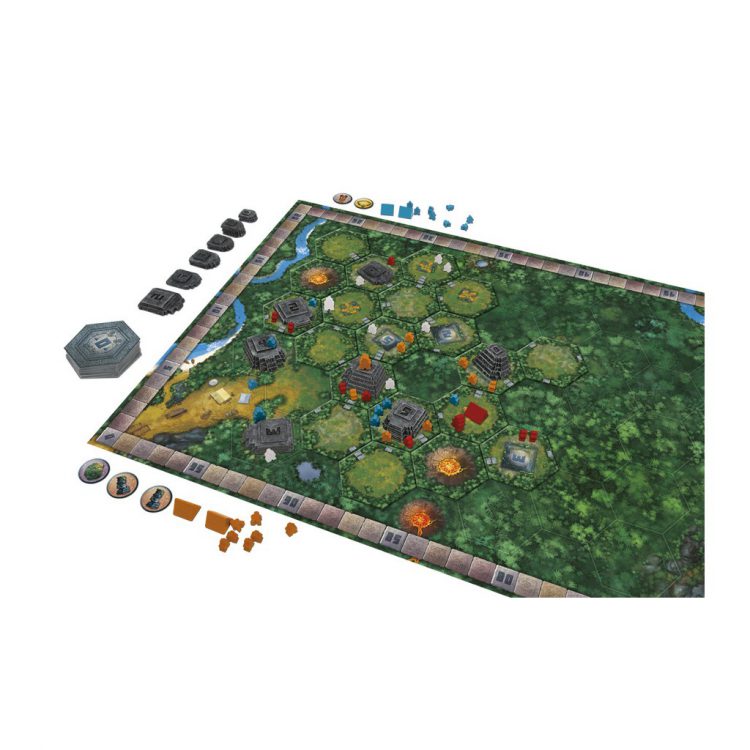
Tikal holds up fairly well mechanically, though it is often used as the ultimate example of games that have too much downtime and can suffer from analysis paralysis. With a large menu of actions and various ways to use your points it’s easy for folks to get stuck mathing out their turn and bogging things down. Despite that though, it’s remained in print for a long time and is still a worth title to seek out.
I do want to circle back to the setting for the moment. As much as I love it when Guatemala makes an appearance in the things I’m interested in and I do love having a game called Tikal on my shelf, Tikal’s treatment of the setting is very much “of the time” and is not one I would celebrate in a new game these days. It is inherently a game of exploitation; you are excavating temples, claiming them for yourselves, and taking “treasures” home. The Mayan civilization is a living one. The K’iche language is still spoken throughout the country. Tikal uses its namesake as window dressing, as was (and still is) common in the Eurograme market. I definitely don’t love that. If this seems a little contradictory to the first paragraph well…welcome to the world of being starved for representation.
Torres
Another action point allowance game? Another game designed by Kramer and Kiesling? Back to back Spiel winners? It’s almost like Torres was designed before Tikal even made it to print. Allegedly the release date on these two games was staggered so they wouldn’t compete with each other to win the Spiel and it’s easy to see why.
At its core, Torres is similar to Tikal. On your turn you’ve got a pool of action points that are spent on a menu of actions to influence the board. Where Tikal’s hook is building a route of hexes so that you can efficiently move your explorers around the board to claim temples, in Torres you are building castles up and out hoping to land your knights on valuable spaces. Torres is built (literally) out of plastic tiles that stack ever taller as you and your opponents build your castles up and out.
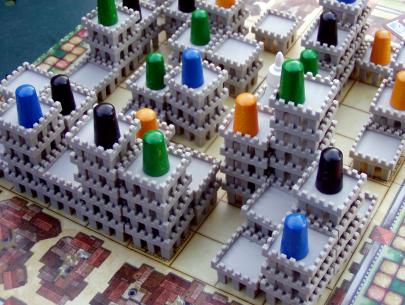
When scoring rounds occur, you score based on the level of your tower and the size of the tower. A Knight on Level 3 of a 4 space tower will score 12 points; if that same night were on Level 4 it’d be 16 points. While there are some additional wrinkles and cards that give you powerful one-shot abilities, you’ve got the gist of it already. Torres is notably has the highest complexity rating of any Spiel winner. If it were published today it would almost certainly compete for the Kennerspiel over the Spiel, though I doubt it would win in today’s market.
Sherlock Holmes Consulting Detective
Winning Spiel des Jahres all the way back in 1985, this sprawling mystery boardgame is equal measure intriguing, frustrating and entertaining. A very different beast to anything else in the running, I’ve heard some people express that it’s not even really a boardgame (it has a board though, checkmate critics). It’s something more akin to a choose your own adventure game, played out as a group. Cast into the roles of the famous detective’s assistants/competitors as you attempt to solve an intractable mystery by investigating locations, reading the daily papers, interviewing suspects and testing hypotheses.
Whenever a game is still in print (and still being expanded) 35 years later you know it really has captured something special, and Consulting Detective is definitely that. As soon as you spread the map of Victorian London out across the table and unveil the mystery to be cracked you know that this is something special. Investigations are made almost exclusively by choosing to do certain things or go to certain places (all marked with numbers on the map) and referencing an entry in a little booklet that gives you more hints and plot twists as you go. At its best it’s like slipping into a Sherlock Holmes story perfectly, your group plotting and thinking, coming up with wild ideas and chasing them down, revealing the hidden truth.
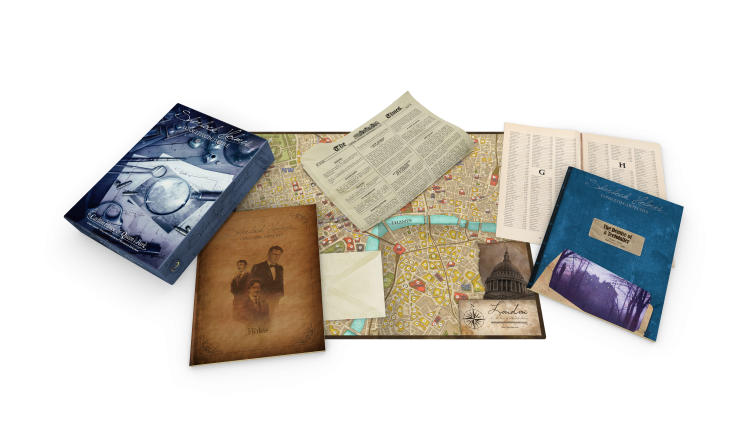
But it’s not perfect, and at its worst it’s an evening of frustrating deadends, missed clues, confused narratives and dissatisfying endings. At least one investigation ended for us being so baffled we gave up and read the conclusion – only to discover there was a misprint in our copy that had sent us spiralling in the wrong direction and unable to solve it without a huge dose of luck. Sometimes you spend ages just desperately slapping at the game for more data, only for a new daily newspaper to render your actions to date pointless. Barring the misprints however, some people will find that this actually enhances the experience – sometimes mysteries are genuinely mysterious, and you don’t feel like it’s drip feeding you anything so you can’t fail. That’s refreshing and compelling and definitely improves the experience overall.
I can’t even begin to pretend that Consulting Detective is a perfect game, or even a great game, but what it is might be near unique. There are so few competitors to it, even decades on, and those suffer with their own flaws. Simulating the mechanisms of detection that fuel the greatest detective stories ever written is a herculean task and those Consulting Detective doesn’t always manage it, it comes closer than seems reasonable and is often an absolute delight.
Quirkle
Originally developed by Susan McKinley Ross and produced in 2006 by MindWare, Qwirkle grew in popularity over time and was eventually awarded the Spiel des Jahres in 2011. Very frequently compared to Scrabble for its tile placement and scoring mechanics, this game requires less knowledge of language and instead emphasizes skill in pattern recognition and preplanning.
To play the game, two to four players draw six tiles from a pool of 108 random squares, each of which contain one of six shapes colored one of six ways. Players make plays by arranging one or more of those tiles onto the table while seeking to either match shape or color (or both) and are scored based on the size of the lines they can build (up to six tiles in length) in any direction. In this way, players can play off each other’s arrangements to multiply their score in both the horizontal and vertical. Players that manage to combine either all six colors of the same shape or all size shapes of the same color are said to have scored a Qwirkle which nets them a bonus 6 points. Players continue using tiles and replenishing their supply from the pool until no tiles remain; the player who uses up all their tiles first ends the gameplay and scores an extra 6 points. Easy-to-score and to the point.
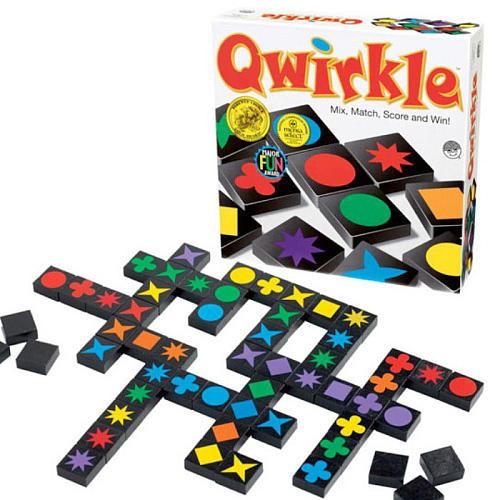
This is one of those games that has incredibly simple mechanics but a good amount of gameplay depth, making it a strong general option to have in your collection. As you have no input during other player turns, once you have the gameplay down you can attend to other things and return to the table when your play comes around. As it’s a simple matter of shape and color, even children can join in pretty seamlessly for family play which makes it an ideal choice for game night generally. Just like Scrabble (and about any other game in existence), skill mismatches can quickly lead to very one-sided play so players looking to have a fun time with newcomers will likely need to hold back a bit.
Auf Achse
HONK HONK. Auf Achse comes rumbling in as one of this bracket’s Play-In Game winners. A hard-to-find classic, it faces tough opposition in Kingdomino.
Kingdomino
When people say “fun for all ages” they usually mean “bad, but it will distract the kids.” Not Kingdomino. This game is as fun to play, as it is simple to learn. And they aren’t kidding with the advertised 15 minute playtime, either. It’s fun, simple, and fast. Just what you are looking for in a Spiel des Jahres winner. But what is it, exactly?
Kingdomino is a tile drafting, kingdom builder for 2-4 players, ages 8 and up. On your turn, you pick up the tile you selected during your last turn, place it in your kingdom, select a tile for next turn, and that’s it. That’s everything. You repeat that until you’ve gone through the tiles, and that’s the whole game.
Okay sure, there are some other rules. After all, there are enough instructions to fill an entire single sheet of paper. Each rectangular tile is made of two squares of terrain like fields, lakes, forests, etc. When you place a tile, the edge of at least one of it’s squares must be touching a matching edge already in your kingdom. For example, if you draw a tile that has a forest and lake, then you need to either place it with it’s forest touching a forest already in your kingdom, or place it with it’s lake touching an existing lake. The exception being the single square castle tile that each player starts with. That castle acts as a wildcard and you can place any tile next to it.
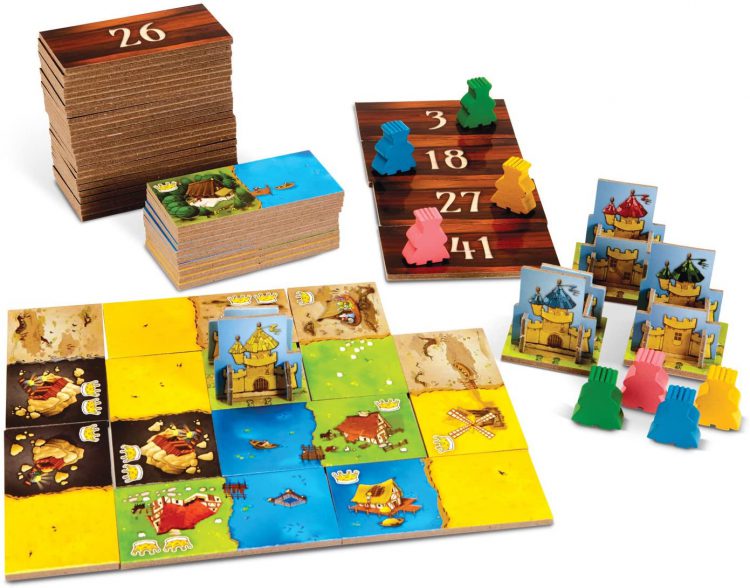
Your entire kingdom is constrained to a 5×5 square, and you score points by counting the tiles in a region, and multiplying that number by the number of crowns printed on those tiles. So a connected region of 5 forests, with a total of 3 crowns on it, would be worth 15 points. But if that’s the whole game, why wouldn’t you always just pick the best tile every turn?
The drafting mechanic is what holds this game together, and it’s brilliant. Whoever picks up the worst tile this turn gets first dibs on a tile for next turn. But if you pick up the best tile, then next turn you are stuck with the tile that nobody else wanted. This makes the game self-balancing, if your opponent gets the perfect tile, then you can force their hand next turn, giving them a garbage tile that’s worth 0 points or, worse, they can’t even place in their kingdom!
The entire game is a balance. Pick a strong tile now or have a strong next turn. Notice that a tile is weak for you, but take it anyway just to deny it from an opponent who has the perfect spot for it in their kingdom. All this in a game that is small, cheap ($20 USD), easy to learn, and very, very good.
Bracket Wrap-Up
Every year in the tournament there is a “soft” bracket and a bracket lovingly called the Bracket of Death. Inevitably fans complain that their team got the Bracket of Death and their rival got the soft bracket. It’s part of the March Madness experience. In our case, the Southeast is definitely the softest of the 4 regions. That does not at all mean the games aren’t just as good or worthy of their award, it just means that there is no Carcassonne/Dominion Clash of the Titans. It also means there’s a great chance that a lesser known game makes the Final 4 which is always exciting.
In the top half of the bracket we open with a stunner as Rummikub dispatches Just One! This Play-In game nominee earns its win by being familiar with the Just One formula; the whole “if multiple people pick the same word they’re blanked” has been seen over and over and making it the core of a game is not enough to beat out the fast paced tile fun of Rummikub. Tikal vs Torres is a very interesting matchup; same designers, similar mechanics, and published only a year apart! Both have roughly remained in print and are worth playing. So who wins this game? We’re giving it to Torres in an overtime match up.
Unfortunately, the late night finish and travel to the Sweet 16 means that Rummikub knocks them out in another upset! How is this plucky upstart managing this? Well…novelty. Not novelty in the cheesy gimmick sense, novelty in the sense that Torres is one of a million mid-weight Eurogames you can find on the shelves of your local FLGS these days. Is it one of the best? Sure, of course. We aren’t trying to take anything away from Torres but you can get that kind of thinky tactical experience from a few places. Rummikub, almost by virtue of being a mass-market rendition of a card game, doesn’t feel like many modern hobby games. It somehow ticks the same parts of your brain that combo-engine builders and tableau games do without actually looking or feeling like one.
Down in the bottom half things are a little more steady. Sherlock Holmes and Kingdomino both advance easily to the Sweet 16 over their competition and set up a battle of contrasting styles. Sherlock Holmes is the venerable blue blood whose been here before and will be here again. Kingdomino is the more recent up-and-coming program, your mid-major that no one wants to play against. We’re going with Sherlock Holmes however. Despite its age, it still feels fresh and new to anyone who has never played and you can draw a straight line from the modern burst of Escape Room and Choose Your Own Adventure style games to this title.
Our Winner
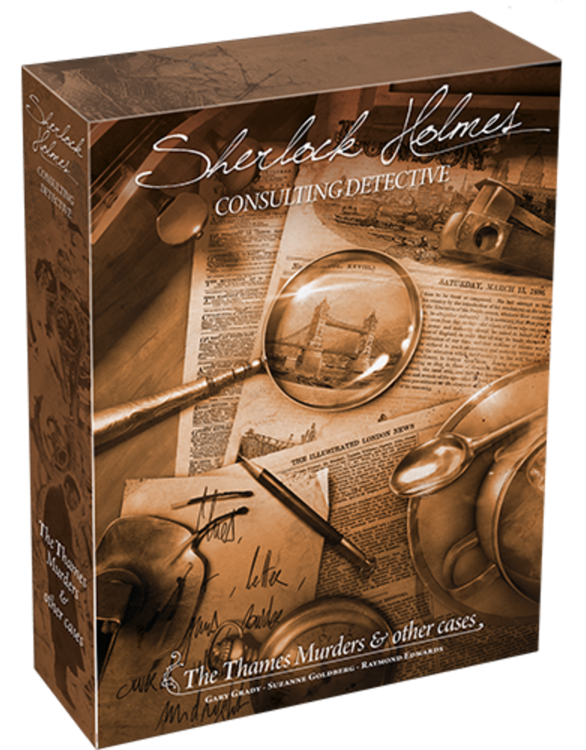
I need everyone following along to know how hard this was. You know how every tournament the camera pans to crying kids who can’t believe their team lost? And the announcers talk about the pain of March and how wild it is that all these great teams end their season on a loss? That’s me I’m the crying kid right now. When Tiffany first revealed the bracket I penciled Rummikub into the Championship Game and told the writing team that it was a low-key dark horse to win the whole thing.
I love Rummikub. I played hours of it as a kid. It holds up, really well! I want you all to buy, borrow, or steal [Ed. Seriously, we do not endorse crimes.] a copy and give it a whirl. But…Sherlock Holmes is also fantastic. It is hours of well written mystery, of clues and riddles, of side plots woven into newspaper classified ads. You don’t just solve a mystery puzzle, you have to tease bits of seemingly unrelated info together into a picture of the crime the way Sherlock does in film and on the small screen. It sings.
It has also influence the industry in major ways. We’re seeing a renaissance of Choose Your Own adventure style narratives in board gaming and you can feel the influence of Consulting Detective in them. Making an entire game out of text and maps seems impossible but I’d be surprised if we get Legacy of Dragonholt—a game I adore—without Sherlock before it. Rummikub, the Cinderella of the tournament, will have to be content with an Elite 8 finish and the knowledge that it probably would have beaten out other games like Dominion had the bracket shaken out a little differently.
